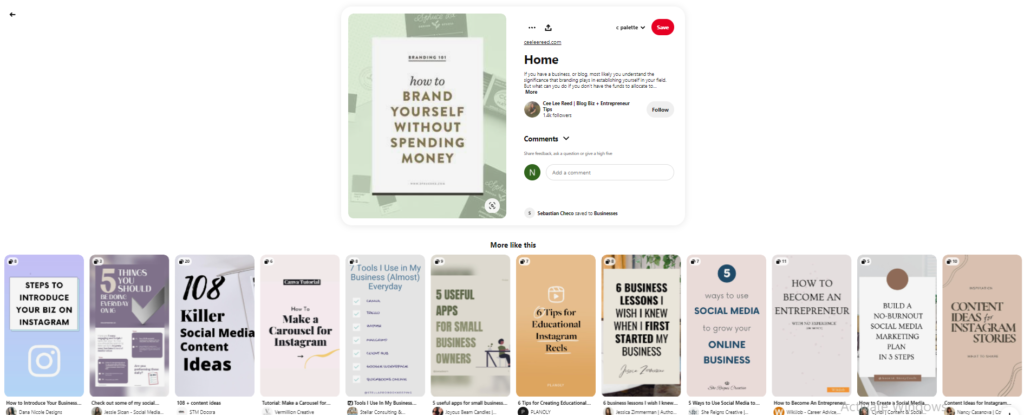
Table of Contents
- Understanding Blog Writing
- Methods to Find the Best Blog Topics
- Make a keyword search
- Allow them to become acquainted with your company.
- Examine social media websites
- Interact with others
- Ask your readers
- Collaborate with an expert
- Get ideas from your competitors
- Extract ideas from non-internet marketing publications
- Come up with ideas from community platforms
- Check up on your email newsletters
- Bring your process to life
- Don’t be afraid to get controversial
- Keep tabs on your support team
- Build brand authority
- Create a survey about your industry and write about the insights you have
- Assess the effect of your blog content
- Answer a few frequently asked questions
- Top hacks for generating blog topics quickly
- Amazon Look Inside & Google Books Preview Feature
- Use Google Trends
- Pinterest Auto Suggest
- Quora Suggestions
- Google Alerts
- Top Blog Idea Generator
- Conclusion
- Key Takeaways
- FAQs
Are you finding it difficult to decide what to write about in your next blog? Are you confused about what the best blog topics should be?
To get started on the path to successful blogging, you need to be able to generate new blog post ideas fast. Whether you are crafting your content for your blog post or outsourcing it, you need an endless stream of up-to-date and relevant ideas to keep your readers engaged. Presenting quality ideas to readers is one of the most challenging tasks marketers usually face.
You need the inspiration to keep going, and sometimes borrowing ideas work just fine. There are countless blog post ideas online to inspire you regardless of the industry you are in. Although they won’t always be brand new, exciting viewpoints are always welcome. It is through your unique perspective that you can impact your customers and keep them hooked.
So, let us dive in and understand how to get inspired and start creating highly exceptional blogs. We will also examine a few strategies that can help you generate blog writing topics.
Understanding Blog Writing
Providing relevant and valuable content through consistent blogging is an effective way to increase your online business.
Properly crafted and well-researched blog posts are an inexpensive method to drive traffic, augment inbound marketing efforts, and fascinate more potential clients.
You need to create useful blogs as part of your consistent strategy in marketing to attract customers. You must ensure that your audience has something significant to gain from each blog you create.
You need to structure your blog with a solid outline and excellent content strategy to achieve predefined business and marketing goals; a hit-or-miss approach can never grow your blog.
All these efforts take time, and you need to be patient and put consistent efforts to overcome the challenges. Prioritize and put your customers first, and remember that it is only through great content that you can influence your customers’ lives. Each blog that you write must offer something of value to your readers – we cannot just overemphasize the need for this.
Useful blogs attract more targeted visitors to your site resulting in improved leads and more customers. You will also have the benefit of becoming a commanding influencer in your industry. All you need to do is find the best blog topics.
Methods to Find the Best Blog Topics
1. Make a keyword search
Let’s say you’ve previously published a few blogs. If you did it right, you did some keyword research to ensure that your blog would rank well on Google. Use Google Keyword Planner to come up with some new themes to write about if you haven’t already. You’ll find more relevant keywords if you search for the keywords you used.
These aren’t complete blog article ideas, but they should get you thinking. Plus, you might come across a keyword that you can easily cash in on. It is not necessary to choose a low-ranking keyword. While low-traffic areas are easier to dominate, they may not be particularly engaging.
2. Allow them to become acquainted with your company
People want to buy from people they are familiar with. They can trust you if they know you, and if they can trust you, they will want to work with you. You can utilize your blog to help others get to know you better on occasion. Consider creating a profile of your company’s personnel.
Even if your company runs on a modest scale, a few short profiles may pique the interest of potential clients. Of course, you don’t want to get too personal, but don’t be afraid to chat about your kids or show off family photos.
3. Examine social media
Social media, believe it or not, is one of the finest areas to look for unique blog ideas. On every site, people are chatting about anything and everything, and it’s free content for you. Reddit is one of the finest places to check out for best blog topics. Users on Reddit frequently respond with lengthy posts. You might even be able to locate a page dedicated to your particular field. If you don’t, you may ask readers what they’d want to see from, say, a pool, patio, or landscaping blog. People may like coming up with new ideas for you.
4. Interact with others
When more individuals are involved in the content creation process, it always works out better. Ask your staff and other company partners what they think should be on your blog. You might also ask your customers what they would like to read about in a blog. After all, the blog is for them!
5. Ask your readers
One of the simplest ways to find the best blog topics is by asking your readers what they want to know about next. You can create fun polls on Twitter to find the needs of the audience. If the answers to your questionnaire frequently throw up existing blogs, make sure that you reply to each comment or DM with existing material on your site. This way you improve engagement and also examine the pressing questions people are asking in your industry.
6. Collaborate with an expert
If you’re having problems coming up with blog post ideas regularly, collaborating with a professional marketing firm can be a good idea. Tell them your needs and what you want to do with your site after you’ve contacted one. They should have no trouble coming up with suggestions for you because they are professionals.
They’ll also be able to assist you with tasks other than creating blog posts. They might notice other ways to improve your SEO game and get more clients.
7. Get ideas from your competitors
Competition helps you learn better.
It is vital to stick to your niche and learn what type of blog posts are working for other successful marketers. To march ahead of the competition, borrow relevant ideas from commanding voices, write something better, and offer your readers content with a creative angle.
Ahrefs, a tool for backlink analysis and competitor research for marketers and SEO, will help you learn everything about your competitor blog posts as well as that of your own. You can create valuable content for blog posts from headlines that are popular and widely shared on social media sites. This can give you an idea about the best blog topics.

So, it is important to connect, understand and interact with industry authority marketers, get ideas from your competition, and have a roadmap to overcome challenges.
8. Extract ideas from non-internet marketing publications
The internet cannot be the sole source of blog post ideas. In other words, don’t think that you can get the best blog topics only in cyberspace. Print publications are still prominent in the non-internet marketing sphere. Industry magazines and journals can be a significant source of ideas for marketers to create valuable content for readers. In fact, they can offer some of the best blog post ideas for beginners.
However, you need to be careful while choosing the publications. Select the ones that are relevant to your niche and are a trustworthy source of information.
Newspapers can also offer vital inspiration to get blog content ideas. You can also get ideas for your blog posts from other non-internet marketing magazines that are published monthly or quarterly. Take inspiration from magazine covers and study them to create engaging headlines.
9. Get ideas from community platforms
Community activity platforms like Tribe, Discourse, and Vanilla Forums, can be sources of inspiration to consistently get blog ideas. Access platforms that regularly share articles. Look at posts shared on LinkedIn and Facebook for inspiration as well.
If you don’t have time to go through community activity platforms, consider outsourcing the task.
Specific industry and niche blogs can provide countless ideas to create valuable content for blog posts. Access these industry blogs that share content regularly:
- Copyblogger
- Backlinko
- QuickSprout
- Search Engine Journal
- Convince & Convert
- Content Marketing Institute
- Moz

10. Check your email newsletters
Another possible way to grow your blog is by subscribing to emailers of popular blogging sites. These emailers give access to the latest blog posts and offer tips to assist you in driving traffic. Subscribe to emailers of authority bloggers in your industry.
Always be open to attending seminars, conferences, and workshops covering specific niches and associating with people who can help you ideate.
11. Bring your process to life
If you have perfected a method for doing something in your industry, you can provide what insights you have gained in a blog. For example, if you use a particularly useful calendar tool to plan content or you’ve seen a massive improvement with a new update for software you use frequently, write about these and let people know your honest opinion. While you may not benefit from affiliate links, it’s important to show your audience that you are a genuine creator.
12. Don’t be afraid to get controversial
Noticing a certain trend in your industry that is irking you? Are buying patterns and consumer preferences changing for the worse? Take your time out to ensure that your audience understands the value you provide with your services. If there are topics on government regulation or banter in politics that might affect your industry significantly, make sure that you voice your opinion on the same. You can take sides but be genuinely curious about other opinions too. Make your social media space an open platform for any discussions. Make your voice heard.
13. Keep tabs on your support team
Oftentimes it so happens that brands get similar queries or complaints on their products or services. Take your time to address these issues via a blog. Offer honest and useful solutions to your clients. If you’re in the process of improving the quality of your product, make sure that you mention the same. Brands that are approachable and genuine are much more likely to get organic views on their blogs. If you’re a creator, the same may apply to you.
14. Build brand authority
The way you show yourself as a subject matter expert in your field is by explaining to your audience the insights about your industry in simple terms. For example, if you have an opinion on where your industry is heading in the next ten years, make sure that you pen it down. This is especially crucial for tech-driven companies and B2B niches where it’s important to ensure that your brand’s and your client’s long-term goals are aligned.
15. Create a survey about your industry and write about the insights you have
If you have a good email database as well as followers on social media, send out a survey requesting for opinion. For example, if you’re in the beauty industry, ask questions about the latest or trending skincare products in the market. Find out how effective they were and if they had observed any side effects. Find out how open your audience is to paying a premium on vegan or all-organic skincare products. Keep it exciting and make sure that you get the maximum outreach through the survey. Use the results and insights you’ve found to draw conclusions about where the market is heading and write a blog on it. This way, you can get some of the best blog topics.
16. Assess the effect of your blog content
It is always important to assess the effect of your content and accordingly optimize your future content. It will help you decide whether or not you should continue doing the same activity or shift to a new niche or content.
Measure your results in a set time frame and if you find that your traffic is not increasing, start over.
17. Answer a few frequently asked questions
Is there anything about your business that everyone seems to have a question about? You can have a blog post if you can think of one. People may frequently enquire about how to maintain a backyard pool, for example. There’s a blog content idea for you there.
Or perhaps there’s a common problem among patio owners. You might also write about it. You don’t have to limit your responses to questions about your services. Answer some broad questions regarding the outdoor living sector in general. You might turn it into a page on your site with links to each blog post when you’ve written a few of them. You could even create an eBook about your FAQs if you write enough. This in turn can generate some of the best blog topics.

Top Hacks to Generate Blog Topics Quickly
1. Amazon Look Inside & Google Books Preview feature
Research top trending books in your industry and take a look at their table of contents. Read a couple of paragraphs. It’s highly likely that you’ll find ways to incorporate new styles and opinions in your blog. If you find any sections useful, it may be worth considering buying the book and writing a review on it.

2. Use Google Trends
Google Trends allows you to understand the popularity of keywords over time. You can also compare the same across different regions in your country as well as in other countries. Such insights are especially useful when you want to create newsworthy content about trending topics.

3. Pinterest Auto Suggest
Pinterest is an underutilized tool for its great analytics. Create mood boards of the best blog topics so that you’ll frequently be able to get suggestions on certain ideas and topics. They may not be hugely popular at the moment, but it’s much simpler to find niche topics that might truly resonate with your audience.

4. Quora Suggestions
Quora offers a wealth of ideas on popular topics. The best part is that you can scroll through suggestions, comments and even follow up on related questions to a topic. This helps you in crafting a full structure for your blog. Not only that, you can be confident about generating multiple titles with just one quick search.

5. Google Alerts
Google Alerts helps you keep tabs on the latest market news as well as on trending articles in your domain. Be sure that you set up as many alerts as you like, and follow brand news too, so that you can get in on the action early.

Top Blog Idea Generator
Although blog idea generation usually thrives on organic research from the content strategy team, keeping a few automated software in your toolkit is always helpful. This can help you generate blog content ideas more quickly. Here are the topics:
1. BuzzSumo
BuzzSumo’s content discovery engine generates keywords, trends, and topics based on your niche. It also aggregates community forums and social media posts, so you have a clear idea about the things that pop up as discussions fairly often.
2. HubSpot
HubSpot’s blog topic generator allows you to add multiple keywords during a search. This helps achieve very good results on niche segments. Although the topic generator isn’t strong on analytics, it generates titles quickly so you get multiple angles from which you can approach your next blog.
3. PepperType.ai
PepperType is a comprehensive solution for generating everything from topics to basic bullets and SEO. It makes it easy for you to quickly generate quality content. Bloggers as well as big brands can benefit from the automated solutions.
4. Portent
Portent helps you generate creative titles quickly and easily. Once you type in your niche into the search bar, Portent matches the keyword with trending articles and blog titles on the net. If you’re a lifestyle blogger or your brand is open to covering a wide range of topics, Portent’s generator can help you get ideas quickly.
5. Tweak Your Biz
This basic generator creates hundreds of titles at one go. They’re suitable for generic brands, products, and services. The best part is that you can copy all the titles to your spreadsheet at once, so you can quickly filter through what you like and what you don’t. Once you’ve chosen the 10-20 that work for you, you can use them to fill up your content calendar for the coming weeks.
Conclusion
The world is full of inspiration; just look around you.
Be passionate and take a different approach to fuel your mind with ideas on the internet and those out there in the real world.
Anytime you lack inspiration, just start implementing the strategies mentioned above, and you will have some great content to engage your readers and improve your conversion rates. All in all, here’s your roadmap to creating the best blog topics.
Key Takeaways
- Keep tabs on trends on social media to get the best blog topics.
- Always have a strategy in place. It’s not enough to write consistently. It’s also important to give your readers a good mix of informative, promotional and entertaining content.
- Generate unique blog ideas to keep readers engaged.
- Oftentimes, the best blog topics come from our own experiences.
- Never rely wholly on topic generators to fill up content calendars.
FAQs
Check out these ideas for your calendar to make sure that your blog is up-to-date in 2021:
1. Use the active voice
2. Avoid multitasking while brainstorming
3. Find a suitable blogging schedule and stick to it
4. Be more generous with bold texts
5. Build your platform
6. Share your backstory
7. Write to express and not to impress
8. Spend enough time on writing your blog
9. Know what to do when you get stuck
10. Crack the technology code
How-to guides and beginner’s guides are a hot favorite for every niche as it provides a good balance of information and promotion. Apart from these, interviews and FAQs also tend to perform well.
If you’re just starting out as a blogger, make sure that you ex[eriment with every type of blog. Apart from what’s easy for you, you must also understand what your audience likes. Try to strike a balance between the two for the best results.
Apart from the usual guides and reviews, B2B blogs can provide insightful information about your management and customer support approach. Pick a few examples that feature your top client responses and talk about how your products benefitted them. Apart from this, you can also highlight any CSR contributions you make.
Five steps to creating a content marketing strategy include:
1. Set your goals
2. Define user personas
3. Do a content audit
4. Create an editorial calendar
5. Create a content infrastructure
Latest Blogs
Learn how to rank on AI search engines like ChatGPT, Perplexity, and Gemini by optimizing your content for authority, structure, and relevance. Stay ahead in AI-driven search with this strategic guide.
Explore the best healthcare SEO services for your medical practice. Improve online visibility and effectively reach more patients in need of your services.
Discover top social media agencies specializing in banking solutions, enhancing financial services and driving engagement.
Get your hands on the latest news!
Similar Posts

Artificial Intelligence
5 mins read
Top AI Blog Writing Tools for Website Monetization

Blogging
10 mins read
How to Start a Successful Food Blog in 2022

Blogging
4 mins read